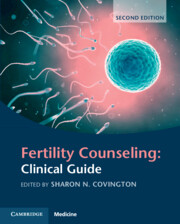Book contents
- Fertility Counseling: Clinical Guide
- Fertility Counseling: Clinical Guide
- Copyright page
- Dedication
- Contents
- Preface
- Contributors
- I Introduction
- II Therapeutic Approaches
- III Third Party Reproduction: Assessment and Preparation
- IV Addressing the Needs of Diverse Populations
- V Special Topics in Fertility Counseling
- Chapter 19 Resilience in Reproductive Loss
- Chapter 20 Reproductive Trauma and PTSD: On the Battlefield of Fertility Counseling
- Chapter 21 Pregnancy Loss Counseling
- Chapter 22 “A Little Bit Pregnant”: Counseling for Recurrent Pregnancy Loss
- Chapter 23 Pregnancy and Postpartum Adjustment in Fertility Counseling
- Chapter 24 Walking the Tightrope: The Pregnant Fertility Counselor
- VI Practice Issues
- The International Glossary on Infertility and Fertility Care, 2017
- Index
- References
Chapter 23 - Pregnancy and Postpartum Adjustment in Fertility Counseling
from V - Special Topics in Fertility Counseling
Published online by Cambridge University Press: 24 November 2022
- Fertility Counseling: Clinical Guide
- Fertility Counseling: Clinical Guide
- Copyright page
- Dedication
- Contents
- Preface
- Contributors
- I Introduction
- II Therapeutic Approaches
- III Third Party Reproduction: Assessment and Preparation
- IV Addressing the Needs of Diverse Populations
- V Special Topics in Fertility Counseling
- Chapter 19 Resilience in Reproductive Loss
- Chapter 20 Reproductive Trauma and PTSD: On the Battlefield of Fertility Counseling
- Chapter 21 Pregnancy Loss Counseling
- Chapter 22 “A Little Bit Pregnant”: Counseling for Recurrent Pregnancy Loss
- Chapter 23 Pregnancy and Postpartum Adjustment in Fertility Counseling
- Chapter 24 Walking the Tightrope: The Pregnant Fertility Counselor
- VI Practice Issues
- The International Glossary on Infertility and Fertility Care, 2017
- Index
- References
Summary
In this chapter, common psychological experiences or consequences of recurrent pregnancy loss are discussed for affected women and their partners, with a focus on the experience of pregnancy after or during the course of recurrent loss. In this chapter, recurrent pregnancy loss is understood as a series of ongoing traumatic events and losses. Common experiences during pregnancies after loss, such as emotional cushioning and pregnancy-related anxiety, are conceptualized as understandable reactions to trauma and loss. Consequently, guidelines for helping patients to process trauma and loss and to mitigate associated symptoms of emotional cushioning and pregnancy-related anxiety are discussed, with a focus on the therapeutic relationship as an agent of change in individual and couples counseling.
Keywords
- Type
- Chapter
- Information
- Fertility Counseling: Clinical Guide , pp. 234 - 244Publisher: Cambridge University PressPrint publication year: 2022

